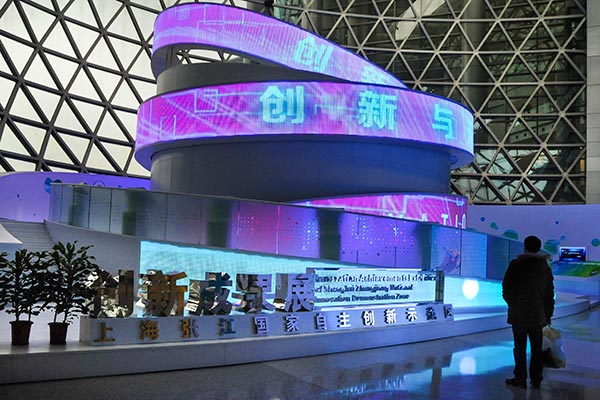 |
|
An exhibition featuring the achievements of Shanghai Zhangjiang National Innovation Demonstration Zone opens in Shanghai Science and Technology Museum. [Photo/CFP] |
Core innovation capability of the China (Shanghai) Pilot Free Trade Zone has been largely enhanced since the municipal government released a framework plan to link the FTZ with Shanghai Zhangjiang National Innovation Demonstration Zone in late November last year.
Officially launched in 2013, Shanghai FTZ expanded in April 2014. By then, Zhangjiang was already a link.
As a manufacturing base of biological medicine for Shanghai and an industry leader in China, Zhangjiang has played an important role in shaping the FTZ's technological innovation against the backdrop of the joint development framework plan.
Its role in the pilot program as a marketing authorization holder system of drugs is significant.
Under the marketing authorization holder system, which is widely adopted in developed markets, drug companies' marketing and production processes are separated. A marketing authorization holder can outsource the production process to different pharmaceutical companies.
However, under China's current Drug Administration Law, marketing authorization and production are combined.
This means, a pharmaceutical company should be in charge of the research and development of drugs as well as production.
The R&D ability and production capability thus remained underdeveloped or contained.
From August last year, 10 provinces and cities started their trial programs of the holder system.
German pharmaceutical giant Boehringer Ingelheim in Shanghai was one of the first companies to implement it.
The firm is China's first contract manufacturing organization or CMO to produce a tumor immunity biomedicine for Beijing-based BeiGene Ltd.
Becoming a CMO is an important part of initializing the holder system.
The tumor immunity medicine will be produced at a production base to be jointly built by Boehringer Ingelheim and State Bio-tech & Pharmaceutical Industrial Base in Zhangjiang. The facility is expected to start operations in 2017.
"The start of the CMO program in China is an important milestone for the Chinese biomedicine industry. We will be able to de-bottleneck the biomedicine industry chain and help with the marketing of more medicines developed by Chinese domestic companies," said Luo Jiali, general manager of Boehringer IngelheimChina.
Since its expansion, the Shanghai FTZ, which takes up only one-tenth of Pudong New Area, contributed nearly 75 percent of the area's gross economic volume in 2015.
Shanghai FTZ's manufacturing sector has witnessed slower growth in the past few years due to overcapacity amid the national economic slowdown. But its services sector has been catching up and showing a more vibrant annual growth rate of 3 percent.
Economic vitality in Pudong has been largely enhanced since the FTZ expanded in early 2014. In 2015 alone, more than 18,000 new companies registered in Pudong. Some 180,000 companies set up shop in the area since its expansion 25 years ago.
About half of the companies with foreign investors that registered in Pudong last year were set up in the FTZ. Their average capital value is $15 million each, much larger than the average 50-million yuan ($7.6 million) of domestic companies in the FTZ.
"The (larger) size of these foreign-invested companies has dispelled the misconception that the majority of the companies set up in the FTZ are smaller ones," said Shen Xiaoming, director of the administration of Shanghai FTZ.
